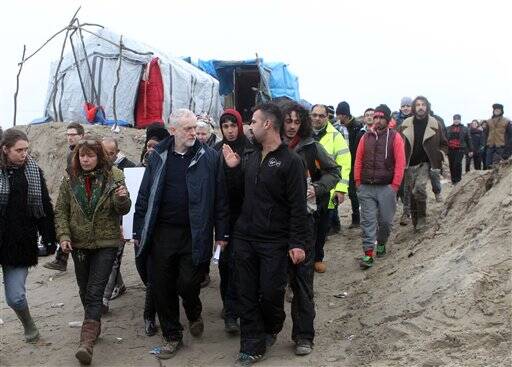An extraordinary and controversial decision on the part of the U.K.’s Tory Premier David Cameron saw him choose, of all days, Holocaust Memorial Day to disparage those refugees gathered at the now-infamous “Jungle” makeshift camp just outside the French port of Calais. The occasion was Prime Minister’s Questions (P.M.Q.s), the weekly half-hour piece of theatre in the House of Commons, in which various members of Parliament catch Mr. Speaker’s eye and get to put a question.
By precedent, like much else in the Westminster system, the Leader of the Opposition gets to go first and had up to six questions. It was in answer to one of Labour Leader Jeremy Corbyn’s questions, about something else (Google's dubious tax-avoidance matter) that Cameron chose to describe the residents of the Calais camp as a “bunch of migrants.” This has caused outrage, not least because you can easily interpret it as a calculated rebuff to the criticism made of him some months ago for the language he chose then, describing these people fleeing violence and persecution, in search of safety, as a “swarm.”
But was it a gaffe, an error of judgement? Ignatian people will be familiar with the “principle of the better interpretation” which binds us to look always for the more generous reading of what our opponent says, where there is a possibility of more than one response. We try to affirm the possibility of forgiveness, too (and we’re in the Year of Mercy, after all). Neither’s easy, each takes some effort and each is quite easy to avoid or explain away.
All that said, we know that the Prime Minister spends most of his Wednesday mornings with his advisors, preparing pre-cooked responses to as many questions as can be predicted, as well as “friendly fire” questions planted among members of his own Tory party—“Does the Right Honourable Gentleman agree with me that …” Knowing this massively reduces the likelihood that this was a mistake.
Many perceive the comment as calculated and distasteful. Mocking Corbyn and his Shadow Chancellor (Finance Minister), John McDonnell, Cameron dismissively described Corbyn's recent visit to the Calais camp as holding a meeting “with a bunch of migrants in Calais” where he “said they could all come to Britain.” Corbyn's meetings in northern France had been with emaciated children and torture victims—refugees from war and oppression. What interpretation, if any, then must we put on Cameron’s response? It's hard to avoid the conclusion that this was part of a continuing effort to portray refugee families as migrants, avoiding mention of why they left all they knew and loved and at least hinting that they come only to plunder U.K. prosperity. And it comes at a time when the refugee emergency has significant strained social services in many E.U. countries, when as the stuttering E.U. response to the crisis itself vacillates and weakens. The refugee population of “the Jungle” includes many frightened and vulnerable unaccompanied kids.
To sum up: Corbyn was attacked in Parliament for having compassion for refugees in a refugee camp. The British Prime Minister, on Holocaust Memorial Day, reduced desperate and terrified people fleeing a conflict with no end in sight as “a bunch of migrants.” It looks intentional. It looks malicious.
We look west across the Atlantic with wonder at candidate Trump’s ever-more outrageous statements, presented as fact, not least his analysis and degradation of Mexican migrants. Now we've got our own version here, and it's just as unpleasant and disturbing.
David Stewart, S.J., is America’s London correspondent.








